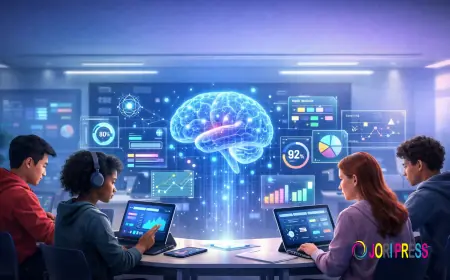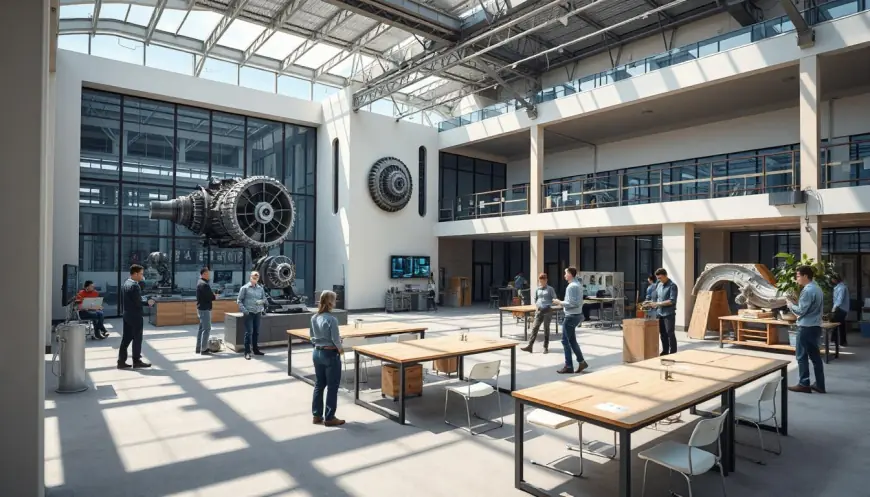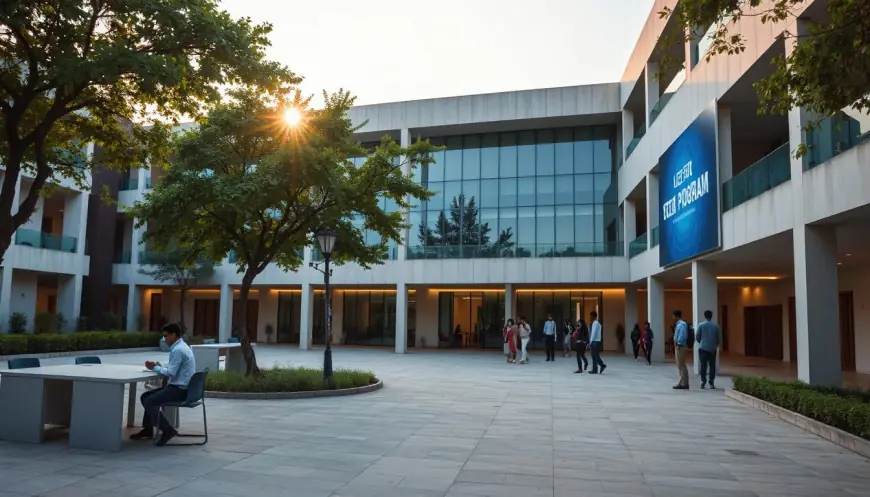Mechanical Engineering Institutes: Pillars of Nation Building & Industry
Explore how mechanical engineering institutes shape nation building and industrial growth by nurturing skilled professionals and fostering innovation.
Introduction
In today's fast-paced, technology-driven world, the role of engineering education cannot be overstated, particularly the field of mechanical engineering. Mechanical engineering is one of the oldest and broadest branches of engineering, dealing with the design, analysis, manufacturing, and maintenance of mechanical systems. At the heart of this discipline are mechanical engineering institutes — specialized educational centers where the next generation of engineers are molded.
Mechanical engineering is foundational to the development of infrastructure, industries, transportation, energy, and more. Consequently, mechanical engineering institutes play a critical role in nation building and industrial growth by imparting knowledge, fostering innovation, and bridging the gap between academia and industry.
This comprehensive blog delves into how mechanical engineering institutes contribute to a country's socio-economic development, technological advancement, and industrial expansion, highlighting their indispensable role in shaping the future.
1. Mechanical Engineering Institutes: An Overview
What Are Mechanical Engineering Institutes?
Mechanical engineering institutes are specialized educational institutions dedicated to teaching the principles and applications of mechanical engineering. These institutes offer undergraduate, postgraduate, and doctoral programs focused on areas such as mechanics, thermodynamics, manufacturing, robotics, CAD/CAM, fluid mechanics, and material science.
Their primary objective is to develop competent engineers equipped to tackle the challenges of modern industry and contribute to technological innovation.
Curriculum and Training
Mechanical Engineering Institutes offer a curriculum that blends theoretical knowledge with practical skills. Students undergo rigorous training in:
-
Core mechanical engineering subjects.
-
Laboratory experiments and workshops.
-
Industrial internships and live projects.
-
Emerging technologies such as automation and renewable energy.
This holistic approach ensures graduates are industry-ready and capable of driving growth and innovation.
2. The Indispensable Link Between Mechanical Engineering Institutes and Nation Building
What Is Nation Building?
Nation building refers to the process through which a country develops its infrastructure, economy, social systems, and governance to improve the quality of life for its citizens and establish a stable, self-reliant society.
Mechanical engineering intersects with nation building in many ways by providing the technical expertise necessary to build and maintain the physical and industrial framework of a country.
How Mechanical Engineering Institutes Contribute to Nation Building
a) Infrastructure Development
Mechanical engineers are pivotal in designing and maintaining critical infrastructure—such as transportation systems (railways, highways), energy plants (thermal, hydroelectric, solar), and water treatment facilities—that support economic activity and improve living standards.
Mechanical engineering institutes train engineers who innovate in materials, structures, and machinery that ensure safe, efficient, and sustainable infrastructure.
b) Technological Self-Reliance
Dependence on foreign technology can be detrimental to national security and economic sovereignty. Mechanical engineering institutes foster indigenous research and development, helping a nation achieve technological independence by creating homegrown solutions tailored to local needs.
c) Economic Growth and Employment
By producing skilled mechanical engineers, these institutes support industrialization, which creates jobs and boosts the economy. Moreover, the multiplier effect of industrial growth stimulates ancillary sectors like supply chain, logistics, and services.
3. The Impact on Industrial Growth
Industry forms the backbone of any developing or developed economy. Mechanical engineering institutes accelerate industrial growth in several ways:
a) Supplying Skilled Manpower
Industries need qualified mechanical engineers to design products, optimize manufacturing processes, maintain machinery, and implement automation. Institutes ensure a steady flow of such professionals who possess both theoretical knowledge and practical expertise.
b) Innovation and R&D
Many mechanical engineering institutes have active research centers where faculty and students develop innovations that lead to better products and processes, increased efficiency, and cost savings for industries.
Examples include advances in CNC machining, robotics, additive manufacturing (3D printing), and energy-efficient systems.
c) Industry-Academia Collaborations
Collaborations between mechanical engineering institutes and industries enable knowledge transfer and practical training through internships, joint research projects, and consultancy. This collaboration aligns academic learning with industrial requirements, improving graduates' employability.
d) Entrepreneurship and Startups
Graduates from mechanical engineering institutes often become entrepreneurs, launching startups in manufacturing, robotics, and machinery sectors, thereby diversifying industrial activity and creating new markets.
4. Curriculum and Pedagogy: Preparing Industry-Ready Engineers
Comprehensive Curriculum Design
Mechanical engineering institutes design their curriculum to cover essential topics such as:
-
Thermodynamics and Heat Transfer: Understanding energy systems and thermal machinery.
-
Fluid Mechanics: Designing pumps, turbines, and HVAC systems.
-
Manufacturing Technology: Learning about traditional and advanced manufacturing methods.
-
Material Science: Selection of materials for strength, durability, and cost-effectiveness.
-
Robotics and Automation: Integration of electronics and computer control with mechanical systems.
Hands-On Learning and Laboratories
Practical experience is a cornerstone of mechanical engineering education. Institutes maintain workshops and labs equipped with:
-
CNC machines and lathes.
-
3D printers.
-
Simulation and CAD software.
-
Robotics kits.
Industry Internships and Live Projects
To bridge theory and practice, students undertake internships in reputed industries where they work on live projects, gaining insights into real-world challenges and workplace culture.
Soft Skills and Leadership Training
Mechanical engineering institutes also focus on communication, teamwork, project management, and leadership skills, which are crucial for professional success in collaborative industrial environments.
5. Mechanical Engineering Institutes Driving Sustainable Industrial Practices
In an era of climate change and resource scarcity, sustainable industrial growth is vital. Mechanical engineering institutes are actively contributing to this cause through:
a) Renewable Energy Research
Institutes conduct research in solar, wind, bioenergy, and geothermal technologies, developing machinery and systems that harness clean energy.
b) Energy-Efficient Manufacturing
Innovations aimed at reducing energy consumption in production processes help industries lower their environmental footprint and operating costs.
c) Waste Minimization and Recycling
Mechanical engineers design systems for recycling industrial waste and minimizing emissions, contributing to circular economy principles.
d) Green Product Design
Educating students on eco-design ensures the development of products that are environmentally friendly throughout their lifecycle.
6. Case Studies: Success Stories from Mechanical Engineering Institutes
Case Study 1: Indigenous Manufacturing Breakthrough
A top mechanical engineering institute developed a low-cost, energy-efficient tractor model tailored for small-scale farmers, reducing dependency on expensive imports and boosting rural economy.
Case Study 2: Industry Collaboration Leading to Automation
Collaboration between a mechanical engineering institute and an automotive manufacturing company led to the development of automated robotic assembly lines, improving productivity and quality.
Case Study 3: Alumni Success in Nation-Building Projects
Graduates of mechanical engineering institutes have led infrastructure projects such as metro rail systems, energy plants, and highway construction, significantly impacting urban development.
7. Challenges Facing Mechanical Engineering Institutes
Despite their vital role, mechanical engineering institutes face several challenges:
a) Keeping Up With Rapid Technological Change
Emerging technologies such as AI, IoT, and Industry 4.0 require continuous curriculum updates and faculty training.
b) Funding Constraints
Research and infrastructure upgrades demand significant investment, often limited by budget restrictions.
c) Faculty Recruitment and Retention
Attracting and retaining qualified educators with industry experience remains a challenge in some regions.
d) Bridging Academic-Industry Gap
There can be a mismatch between theoretical teaching and practical industry needs, necessitating stronger collaborations.
8. The Future of Mechanical Engineering Institutes: Embracing Innovation and Industry 4.0
To maintain relevance and impact, mechanical engineering institutes must:
-
Integrate Industry 4.0 technologies into teaching and research.
-
Foster interdisciplinary education combining mechanical engineering with AI, data science, and management.
-
Promote global collaborations for knowledge exchange.
-
Encourage entrepreneurship and innovation hubs on campus.
9. Why Choose Dr. M.C. Saxena Group of Colleges (MCSGOC) for Mechanical Engineering?
Dr. M.C. Saxena Group of Colleges (MCSGOC) is committed to excellence in mechanical engineering education. With a focus on academic rigor, practical exposure, and industry engagement, MCSGOC equips students to become leaders in nation building and industrial growth.
Highlights of MCSGOC Mechanical Engineering Program:
-
Experienced faculty with industry and research backgrounds.
-
State-of-the-art laboratories and workshops.
-
Strong industry tie-ups for internships and placements.
-
Emphasis on research, innovation, and entrepreneurship.
-
Comprehensive student support and mentoring.
Choosing MCSGOC means joining a community dedicated to producing skilled mechanical engineers who contribute to the nation and the world.
10. Frequently Asked Questions (FAQs)
Q1: What role do mechanical engineering institutes play in economic development?
A1: They produce skilled engineers essential for industrial growth, infrastructure development, and technological innovation, which collectively drive economic progress.
Q2: How do mechanical engineering institutes keep up with industry needs?
A2: Through curriculum updates, industry partnerships, internships, and research collaborations that align education with real-world demands.
Q3: What are the career opportunities after graduating from a mechanical engineering institute?
A3: Careers in manufacturing, automotive, aerospace, energy, robotics, research and development, and entrepreneurship.
Q4: How does MCSGOC support students' professional growth?
A4: By providing quality education, industry exposure, research opportunities, and placement assistance.
Q5: Can mechanical engineering institutes contribute to sustainable development?
A5: Yes, through research in renewable energy, energy efficiency, green manufacturing, and waste management.
Conclusion
Mechanical engineering institutes serve as the backbone of nation building and industrial growth by producing competent engineers, fostering innovation, and supporting sustainable industrial practices. Their role extends beyond education—they are the crucibles where the future of a nation's infrastructure, economy, and technological leadership is forged.
For students aspiring to contribute meaningfully to their country and its industries, joining a reputed institute like Dr. M.C. Saxena Group of Colleges provides the ideal platform to develop skills, gain practical experience, and become changemakers in mechanical engineering.
As India and the world move toward an increasingly technology-dependent future, the importance of mechanical engineering institutes in shaping a robust, self-reliant, and prosperous nation cannot be overstated.
What's Your Reaction?
 Like
0
Like
0
 Dislike
0
Dislike
0
 Love
0
Love
0
 Funny
0
Funny
0
 Angry
0
Angry
0
 Sad
0
Sad
0
 Wow
0
Wow
0


















































